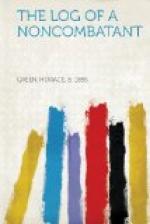Nothing happened after dark, but the next morning at nine o’clock the cannonading started. Inside of half an hour, according to the villagers, the entire German force of the One Hundred and Sixty-second and One Hundred and Sixty-third Uhlans and the Ninetieth Regiment of infantry of the Ninth Army Corps were in the town. They entered simultaneously by three different roads. The burgomaster was ordered immediately to provide rations for the regiment. But the burgomaster was away. He was given twelve hours to return. When he did not return, the burning began, according to the townspeople.
“The soldiers did not wish to burn the town,” said one man; “but the orders were orders of war.” He recounted that four Uhlans entered his house with a bow, and a knock at the door, politely helped themselves to his cellar, drank a toast to his wife, put his chairs in the street, and sat there playing his phonograph. They said they were sorry, but the house must be burnt. But before pouring on the naphtha and lighting the flame they freed his canary bird. Verhagen and the priest agreed that fright brought on an attack to a woman about to become a mother, and that she fell in the Rue de l’Eglise. A German lieutenant saw the trouble, put her on a stretcher made of window shutters, and called the German army doctor. She was sent to a field hospital and tenderly cared for until she and the child could be moved. Such incidents in strange relief, told by men who had lost everything, lent corroboration, if such were necessary, to the burden of their story of the relentless destruction of the town itself.
Our little band was the first to enter the ruins of Termonde after its abandonment by the Ninth German Army Corps. And by a coincidence, we were the last to leave. That very evening, at precisely the time we were crawling across the broken timbers that spanned the Scheldt and connected us with Belgium-owned Belgium, the Germans again pumped heavy artillery fire into the town. This was later known as the second German bombardment and occupation of Termonde. Because of superior artillery range, the attack had the cruel advantage of the man who can strike and still stay out of reach. On that evening at six-thirty, the Teutons sent a few warning shells into the debris, and then the first column of scouts entered simultaneously by the two southern gates. It was just at six-thirty that our party started back for Ghent.
As we crawled across on all fours the remaining beams cracked beneath our feet and the Belgian engineers called on us to hurry. “Oh, Tiber! Father Tiber,” we thought as the last of us got across; but unlike Horatius at the bridge, we were on the right side when engineers applied the match to a small charge of dynamite, and the beams crashed and the remaining planks of Termonde’s bridge writhed and twisted in the rushing waters.
Twenty-seven miles away, when we whirled through the gates of Ghent later in the evening, we said “Au revoir” to Verhagen and the mendicant priest, and went to our rooms. At midnight came a rap at the door; my gray-haired alderman broke into the room, bursting with the latest news, his eyes aflame with excitement.




